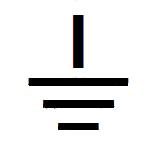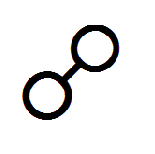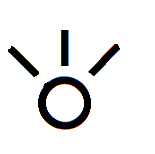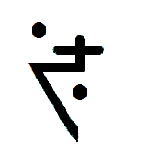Concepts which do not usually exist in other languages:
This is the one thing that makes Hanian very different from many other languages; feel free to use them as needed.
Call to meal – gizzipi
Primarily used to call people to a meal but it can also be used to say let’s eat.
The word is also used to call order during a meal.
bad situation bad mouth – abmul
Word used to describe someone who is clean spoken, unless situation is dire.
abmulta is a situation which would even make a nun speak harsh words.
goofball with friends, serious in front of higher ups – glorva
It means putting on a face of respect and seriousness in front of bosses / superiors; while being more relaxed around friends and those of equal status.
holdover – inkkad
Yes this is used a lot for saying layover, but it’s the general term for things such as those. It is used to say stop over. In addition it’s used to denote someone was held over a grade in school. Also can be used when someone holds something over someone’s head. Lastly it’s someone slowing someone else down, they are the “holdover”, being too needy.
before and among – nukend
We have words to say before someone, as in standing or laying before a person or thing. We also have words which mean to stand, sit or lay among people or things.
However, we have nothing that means both. Hanian does, since if you are standing among your coworkers but also before your bosses; then you are standing nukend — as these are two diverse groups. Used in the series during the datemk; I’ll talk more about that later.
out of time, day out of time, out of calendar day, leap day – kenddau
Yes, it’s the quick Hanian word used to say leap day. However, it’s used for any day out of time, something which is rare in our society. It might be very common in other cultures. Have you ever thought of using it to say you really need a vacation?
Or to describe those people who never look at what day it is because their life is amazing? Want to have a word to say that a culture or a person does not live by the clock, rather living life as it happens? Kenddau can be used to describe these circumstances with ease.
falling in love, after being friends for a while – rizuk
Yes, sometimes we fall in love immediately, at first sight. However, quite a few times it sneaks up on us when we are hanging out with friends. rizuk is anytime you are friends with someone and it turns into something more. The love just happens and it’s usually when it’s strongest
unable to decide, too many good choices – lizia
You know how you sometimes sit there and can’t decide, the choices being too good.
That’s lizia. Like when you take 15 minutes to look over a menu cause you can’t decide.
sweet water made with flowers – icha
A specific thing for a specific concept, usually served cool or chilled on hot days.
previously unknown or exotic food – gipod
Something that is really exotic and you’ve never had it before. It may or may not be according to your palette, but it’s definitely exotic, foreign or unusual. Flowers anyone?
danger via unfamiliar environment / surroundings – amtet
This can be anything from a bad neighborhood to being caught off guard in a foreign country and thus being out of your element. The dangers of the amazon rain forest for example, or trying to trek somewhere without a guide.
last gasp for breath, on the brink of death – trela
We have being on your death bed and we have dying and similar words and phrases. However, nothing is as specific to refer to the last gasp of breath or being on the brink of death. Except a medical term. However, in Hanian, you are covered. This incidentally is also used to point out that a situation isn’t as bad as imagined, yes you may be feeling ill and nasty, but you’re not trela!
someone unfitting for a high position – nidya
Either one is too young for a high position, or one is unfitting by other means. This can mean justified or unjustified a reason. And it does not have to be a very high position, it can be any specific thing that’s an honored position or an envied placement. A short person can be nidya for being a basketball player, while in some very strict places in the middle east someone could say that a person is nidya for being mayor of a city for being a woman.
the quietness late at night – uzwov
You know how your town is deathly quiet late at night, even if it’s a bustling metropolis during the day? Eerie if you’ve ever seen it ghost town deserted because everyone is resting, well that’s called uzwov in Hanian.
everything is wet – she’ach
The general term is used to say everything is quite wet after a rainstorm.
It can also refer to being drenched to the bone or having very wet clothes.
Or to refer to a specific area being soaked, potentially even nearly flooded.
Ironic that the word simply means anti / no dry; like nothing was left dry.
too small / insignificant to see origins or result – nipahu
Yes, the general term for debatable is a lot more useful than just saying something is open for debate. It means that there was too small a sample to know for sure. Or someone is too young / small to see their origins or their future potential. This counts for things too. Or it’s too early in the morning to see where the day is going. nipahu can be used for any of these, just use additional words to show in which way you mean it. Start-ups should love this word with their investors or nagging people who lack faith, simply to say be patient, we’re too small to really know where we will be in five years.
natural turn of events – okdia
It means a natural turn of events. But it can also refer to a naturally progression, such as evolution or the like.
knowing something is dirty – ichrau
Knowing something is filthy or dirty just by seeing it. This can also mean that something is unhygienic or unsafe for sanitation or health. This word is used for unhygienic and unsanitary as a place word, but it’s meaning is much deeper.
forth meal – nozegi
Yes, Hanian has a word for the fourth meal, to describe the late night munchies.
Deeper than that, it’s also any snack or meal eaten when waking up during your sleeping time. Pregnant women can likely relate to that term. This is also used to describe predawn meals eaten by some religions to beat fasting times so they don’t drop. All these are nozegi.
inadequate protection from elements, in clothing – todvu
This does not mean being naked, it’s more of being dressed too scantily to protect from the elements. Most specifically it describes this status for the work being done or the environment it is being done in. It is also used to say you are dressed wrong for the occasion, showing up in jeans to a formal event or wearing a tank top at work in a professional office. Occasionally it can be used to call out someone who is dressed too scantily in public.
These are just a few of the complete unique concepts which have words in Hanian. There are hundreds of these in the language.
Want to learn more? Simply follow this blog and tell your friends!















